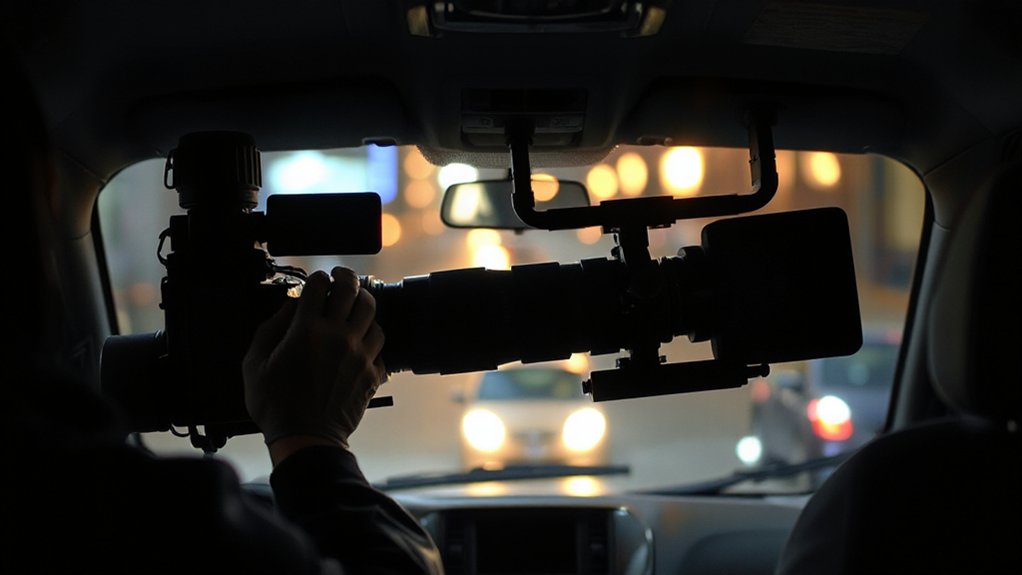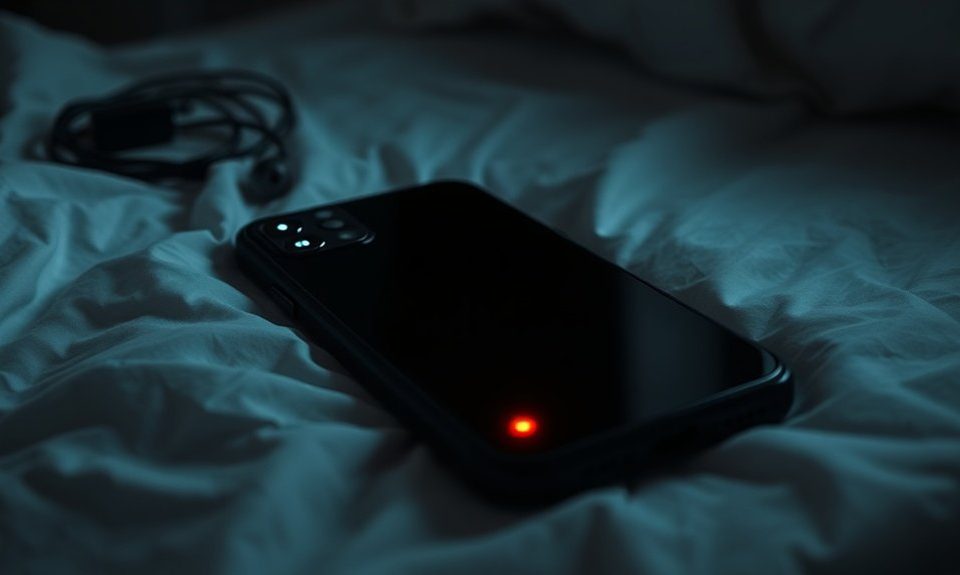Professional investigators utilize a systematic approach combining digital surveillance, physical monitoring, and behavioral analysis to gather legally admissible infidelity evidence. Digital techniques include social media monitoring, smartphone tracking, and metadata collection from communication records. Physical surveillance employs covert observation methods with high-resolution cameras and GPS devices. Investigators analyze behavioral patterns, documenting shifts in communication frequency and unexplained schedule changes. Extensive evidence portfolios require proper chain of custody protocols and cross-referenced documentation to guarantee court admissibility and strengthen investigative foundations.
Key Takeaways
- Establish legal compliance by understanding jurisdiction-specific consent laws and obtaining proper authorization before conducting surveillance activities.
- Utilize digital monitoring techniques including social media analysis, smartphone tracking, and communication metadata to document behavioral patterns.
- Deploy covert physical surveillance using high-resolution cameras and GPS devices while maintaining detailed time-stamped observation logs.
- Analyze behavioral changes in communication frequency, schedule patterns, and physical affection to identify potential infidelity indicators.
- Build comprehensive evidence portfolios combining photographic documentation, digital records, and witness testimony with proper chain of custody protocols.
Legal Boundaries and Ethical Considerations in Infidelity Investigations

When conducting infidelity investigations, individuals must navigate a complex landscape of legal restrictions and ethical obligations that vary considerably by jurisdiction. Professional investigators operate within strict parameters, guaranteeing surveillance activities remain lawful and respect privacy rights. Recording conversations or capturing images requires understanding state-specific consent laws, as some jurisdictions mandate two-party consent while others permit single-party recording.
Confidentiality agreements protect both client and investigator interests, establishing clear boundaries regarding information sharing and case documentation. Consent forms outline investigative scope, methods, and limitations while protecting against potential legal liability. Ethical investigators avoid trespassing, harassment, or any activities that could compromise evidence admissibility in court proceedings. Understanding these legal frameworks guarantees investigations remain professional, credible, and ultimately beneficial for clients seeking truth about their relationships. Additionally, detecting hidden listening devices is an essential practice for safeguarding privacy during these investigations.
Digital Surveillance Techniques and Electronic Evidence Collection
Digital footprints reveal extensive patterns of communication and behavior that traditional surveillance methods cannot capture. Professional investigators utilize sophisticated social media monitoring to examine posting patterns, location tags, and interaction histories across platforms. These digital breadcrumbs often expose relationships, timeline inconsistencies, and behavioral changes that indicate deception.
Smartphone tracking presents another avenue for evidence collection. Call logs, text message metadata, and application usage patterns provide investigators with detailed insights into communication habits. Location data embedded in devices can verify or contradict stated whereabouts, establishing presence at specific locations during critical timeframes.
Digital evidence collection requires specialized software and technical expertise to guarantee data integrity. Investigators must document chain of custody meticulously, as electronic evidence faces strict admissibility standards in legal proceedings. The importance of client confidentiality in investigation processes cannot be overstated, ensuring that sensitive information remains protected throughout the evidence collection process.
Physical Surveillance Methods and Documentation Strategies
While electronic monitoring provides valuable behavioral insights, physical surveillance remains the cornerstone of infidelity investigations for capturing real-time activities and obtaining admissible photographic evidence. Professional investigators employ covert techniques to observe subjects discreetly while maintaining legal boundaries.
Essential surveillance equipment includes:
- High-resolution cameras with telephoto lenses for distant documentation
- GPS tracking devices for vehicle monitoring (where legally permitted)
- Audio recording equipment for capturing conversations in appropriate jurisdictions
Documentation best practices require maintaining detailed logs of times, locations, and observed behaviors. Investigators position themselves strategically to avoid detection while capturing compromising interactions. Chain of custody protocols guarantee evidence integrity for potential legal proceedings. Successful physical surveillance demands patience, technical proficiency, and thorough understanding of privacy laws to protect both client interests and investigator liability. Additionally, investigators often utilize advanced digital forensics to complement physical evidence and substantiate findings in court.
Behavioral Analysis and Pattern Recognition in Suspected Cheating

How do trained investigators identify deceptive behavior patterns that signal potential infidelity? Professional investigators analyze subtle shifts in relationship dynamics through systematic observation. They document changes in communication frequency, physical affection levels, and daily routine alterations. Emotional cues become particularly revealing during questioning about whereabouts or activities.
Investigators track behavioral baselines by noting normal interaction patterns before monitoring deviations. Sudden privacy protection around devices, unexplained schedule changes, and altered grooming habits form recognizable patterns. They observe body language during conversations, noting defensive postures or avoidance behaviors.
Documentation focuses on consistent pattern clusters rather than isolated incidents. Investigators compile timeline correlations between behavioral changes and suspected activities, creating thorough profiles that reveal authentic versus deceptive responses in intimate relationships. Additionally, being aware of clients’ financial stressors, such as repossession impacts on credit scores, helps investigators understand the context for relational changes.
Building a Comprehensive Evidence Portfolio for Legal Proceedings
Although behavioral observations provide valuable insights, professional investigators must transform these findings into legally admissible evidence through meticulous documentation and corroboration. A thorough evidence portfolio requires multiple verification sources to withstand legal scrutiny.
Essential components include:
- Photographic documentation with timestamps, GPS coordinates, and chain of custody records
- Witness testimony from credible sources who observed suspicious activities
- Digital evidence such as communication records, financial transactions, and location data
Each piece must be collected within legal boundaries and properly authenticated. Professional investigators maintain detailed logs documenting when, where, and how evidence was obtained. This methodical approach guarantees the portfolio meets evidentiary standards while protecting the client’s interests. Cross-referencing multiple evidence types strengthens the case’s foundation and provides the clarity needed for informed decision-making. Additionally, utilizing legal protocols ensures that all evidence is gathered and documented in compliance with applicable laws.
Frequently Asked Questions
How Much Does Hiring a Private Investigator for Infidelity Cases Typically Cost?
Private investigators charge $50-150 per hour for infidelity cases, with investigation fees varying greatly based on case complexity and duration. Pricing factors include surveillance hours required, geographic location, equipment needs, and evidence gathering methods. Simple cases may cost $1,000-3,000, while thorough investigations involving extensive surveillance, background checks, and digital forensics can reach $5,000-10,000. Most professionals require retainers upfront before beginning work.
How Long Does an Average Infidelity Investigation Take to Complete?
Investigation Duration varies considerably based on case complexity and subject behavior patterns. Most infidelity investigations conclude within 2-4 weeks, though straightforward cases may resolve in days while complex situations require months. Evidence Collection depends on surveillance opportunities, digital forensics needs, and documentation requirements. Professional investigators typically establish preliminary findings within the first week, allowing clients to make informed decisions about continuing thorough evidence gathering.
What Should I Do if I Discover My Spouse Is Cheating?
Upon discovering a spouse’s infidelity, one should prioritize securing emotional support from trusted confidants or professional counselors. Effective coping strategies include documenting evidence objectively, avoiding confrontational approaches that could escalate tensions, and consulting legal professionals regarding potential implications. The betrayed partner benefits from establishing clear boundaries while processing the revelation methodically. Professional guidance helps navigate the complex emotional terrain while maintaining personal dignity and making informed decisions about the relationship’s future.
Can Infidelity Evidence Be Used in Divorce Proceedings in My State?
The admissibility of infidelity evidence depends entirely on one’s jurisdiction’s adultery laws and whether the state operates under fault-based or no-fault divorce statutes. In fault-based jurisdictions, documented evidence can establish grounds for dissolution and potentially influence asset division or spousal support determinations. The legal repercussions vary greatly, as some states prohibit consideration of marital misconduct entirely. Consulting local family law attorneys guarantees proper understanding of applicable regulations.
How Do I Choose a Reputable Private Investigator for My Case?
Selecting a qualified private investigator requires thorough vetting of investigator credentials and professional licensing. One should verify state licensing requirements, examine years of experience in matrimonial investigations, and request client references. Conducting background checks on potential investigators guarantees they maintain clean records and ethical standards. Professional associations memberships indicate commitment to industry standards. Insurance coverage and detailed service contracts protect clients during sensitive infidelity investigations.
Conclusion
Professional infidelity investigations require systematic adherence to legal frameworks while employing methodical surveillance techniques. Investigators must balance digital monitoring capabilities with physical observation protocols, maintaining detailed documentation throughout the process. Behavioral pattern analysis enhances evidence credibility when properly executed within ethical boundaries. Successful cases depend on thorough evidence portfolios that withstand legal scrutiny. The profession demands technical expertise, legal knowledge, and discretionary judgment to deliver actionable intelligence while protecting all parties’ rights and maintaining investigative integrity.
Let us Help
Stillinger Investigations, Inc.
170 Meeting St, Charleston, SC 29401
843-212-1338







